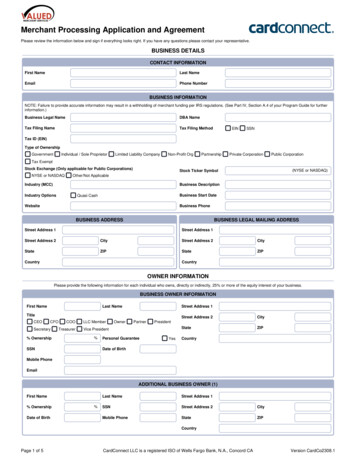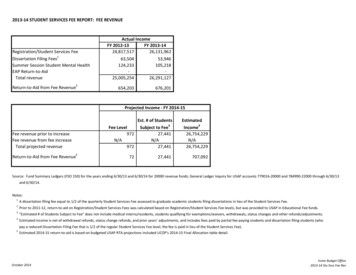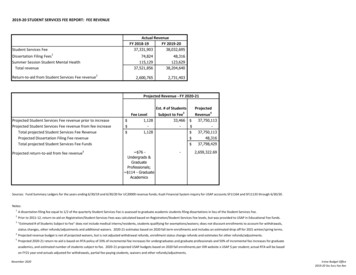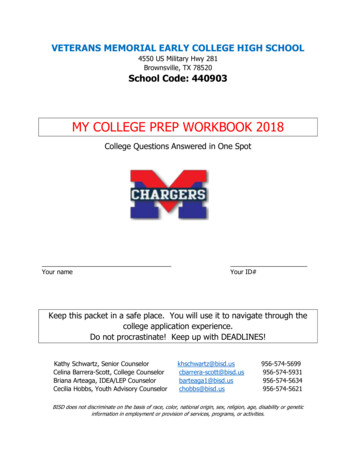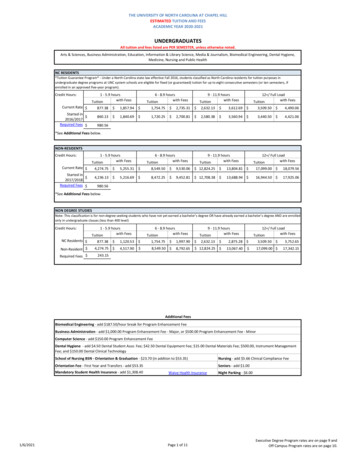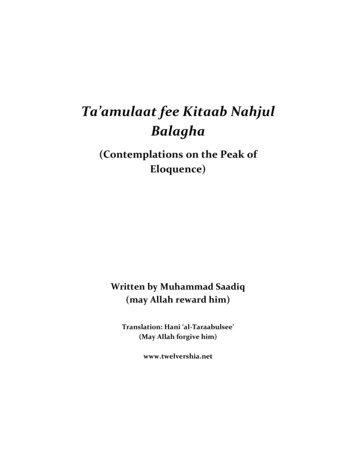
Transcription
Ta’amulaat fee Kitaab NahjulBalagha(Contemplations on the Peak ofEloquence)Written by Muhammad Saadiq(may Allah reward him)Translation: Hani ‘al-Taraabulsee’(May Allah forgive him)www.twelvershia.net
Praise be to God only and may his peace and blessings be upon ourprophet Muhammad, his family, and his companions.Dear respected reader: The reality of the Islamic nation is not hiddenfrom you, its weakness and divisions, surrounded by ordeals andchaos. The reasons of this weakness are many, from them: The greatdifferences within this nation, you will find them divided to sects(Ahlul-Sunnah wal-Jamaa ah, Ithna Ashariyyah, Isma eeliyyah &Khawaarij, etc ) You will find that the followers of each sect aredivided among themselves, for example: The Ithna Ashariyyah(Twelvers) are divided to Usouliyyah, Akhbaariyyah, andShaykhiyyah; each group having their own internal differences andthe same can be said about Ahlul-Sunnah (Sunnies).In the midst of all this, you will have a hard time finding one who hasdedicated himself for reform and unity even though the religious textsplace a lot of emphasis on uniting against the enemy as Allah says:{And hold you fast to God's bond, together, and do not scatter}[3:103]On the contrary, you will observe that constructive dialogue ismissing; when a writer writes a book or treatise directed at hisopponent, his jealousy will cause him to do injustice, then theopponent will read that book or treatise thinking of nothing excepthow to refute its author. Rarely will you find a person who will acceptcriticism and read with intellect while seeking the truth or at leastacknowledge his own mistakes in order to fix them, this a result of theabsence of dialogue, the love of the self and the lack of sincerity.Dear reader: The book in your hands is very brief but very importantsince it has utilized constructive dialogue in addition to respectabledissertations that are much required today, it also has authenticinformation without exaggeration or provocation. The author (of thisbook) decided to be brief and simple – may Allah reward him – sothat the serious researcher may work towards unifying the sects thatadhere to the Book of Allah and the tradition of His Messenger byfinding the truths held inside their main books.Dear reader: Do not be hasty in your judgment; you must readcarefully and ignore the narrations that oppose intellect and instinctfor they are the cause of division.I beg your pardon for these long words,Saalih bin Abdullah al-DarweeshJudge at the Grand Court - al-Qateef
INTRODUCTIONPraise be to God and may His peace and blessings be upon ourmaster Muhammad, his family, companions and those who followhis guidance until the day of judgment.Loving the Messenger (peace be upon him) and his family isobligatory upon the Muslims without extremism; the Muslim musthold on to whatever was established from their virtues in the bookand authentic traditions, he must also reject baseless reports thatwere inserted into the narrations. We were taught by theMessenger (peace be upon him) to worship Allah in our prayer bysending our peace and greetings on Muhammad and his familybefore concluding the prayer, and to say as is recorded in theauthentic tradition: “O Lord, Send blessings upon Muhammad andupon the family of Muhammad as You sent blessings uponIbraaheem and upon the family of Ibraheem; indeed, You arepraiseworthy and glorious.”1 And he (peace be upon him) also said:“I remind you by Allah regarding my household.”2The blessing of intellect:Allah has preferred humankind over the beasts with the intellectand He did not hold accountable those who were deprived of thisblessing since they cannot differentiate. Allah says {And haveshown him the two ways}[90:10] and {Indeed, We guided him tothe way, be he grateful or be he ungrateful.}[76:3]Allah has also given glad tidings to those of intellect andunderstanding in his holy book {Those who eschew the serving ofidols and turn penitent to God, for them is good tidings! So givethou good tidings to My servants - who give ear to the Word andfollow the fairest of it. Those are they whom God has guided; those-- they are men possessed of minds.}[39:17-18] and {Your God isOne God; there is no god but He, the All-merciful, the Allcompassionate. - Surely in the creation of the heavens and theearth and the alternation of night and day and the ship that runs inthe sea with profit to men, and the water God sends down fromheaven therewith reviving the earth after it is dead and Hisscattering abroad in it all manner of crawling thing, and the12Al-Bukhaaree 6352Muslim 2408
turning about of the winds and the clouds compelled betweenheaven and earth -- surely there are signs for a people havingunderstanding.}[2:163-164]The intellect is one of the sources of legislation for the Shia, ZainulDeen Al-Amili, also known as al-Shaheed al-Thaanee says: “Thefoundations: the Book, traditions, consensus and intellect.”3 In alKaafee the Messenger (peace be upon him) says: “Allah did notbestow upon his slaves anything better than the intellect.”4 In AlKafi as well, “We heard Aba Abdillah say: “No treasure is greaterthan the intellect.” Also in that same book Ibn Al-Sukayt asked alRidaa: “What is the divine argument upon the creations today?” AlRidaa replied: “The intellect, through it you recognize the truthabout Allah from the lies attributed to Allah so that you abandonthem.” Ibn Al-Sukayt said: “This is, by Allah, the answer!”5Therefore we must think, we must allow our brains to functionbecause the lack of research shames us and he who does not readhas lent his brain to others, and relied on inheritance forknowledge and religion.Dear reader: The above is sufficient in order for you to think anduse your head for what we shall present.The Words of Imam Ali in Nahjul BalaghaThe status of Nahjul Balagha:One of the top contemporary Shia scholars, Al-Hadi Kaashif-ulGhitaa’ wrote that: “Nahjul Balagha or what abu al-HasanMuhammad al-Ridaa chose from the speech of our master, thechief of believers from the greatest of Islamic books in rank alight for its seeker, a salvation for its holder, an argument forwhoever adopts it, and a treasure for the one who understands it.”6He also said: “Our belief regarding Nahjul Balagha is that all that itcontains from sermons, letters, advice and wisdom is like thatwhich is narrated from the Prophet (peace be upon him) and hishousehold in the authentic and relied upon collections.”7 He also3Al-Rawdah al-Bahiyyah 3/62Al-Kaafee (One of the main Shia books.) 1/125Al-Kaafee 1/296Mustadrak Nahjul Balagha (intro) pg. 57ibid pg1914
said about the commentary of Nahjul Balagha by ShaykhMuhammad Abduh (One of the Shaykhs of al-Azhar in Egypt), hesaid: “From the best of its commentators is the grand scholarMuhammad Abduh for he has explained it with briefly.”8As for the scholars of Ahlul-Sunnah, some of them said: “AlShareef al-Radee compiled it for them and he was aided by hisbrother al-Murtada, their method was to seek short sermonsattributed to the chief of believers then add to it what is correctfrom the words of the chief of believers in Nahjul Balagha amountsto the tenth or half of that, the rest are the words of al-Radee andal-Murtada.”9 It was also said that the author was al-Shareef alMurtada (d.436 AH) and although there is a huge gap betweenthem and Ali may Allah be pleased with him yet they narrate fromhim directly without chain. This method was also adopted by thecontemporary author of Mustadrak Nahjul Balagha.10 How can henarrate from Ali who lived in the first century while he himselfdied in the fourteenth century without mentioning sources or anychains of transmission!? But who knows, maybe after centuriesfrom now another will come and narrate from Ali may Allah bepleased with him with that same methodology!!Despite the status of this book in the eyes of Shia and the status of Ali, who is claimed to be protected from lying, error, andforgetfulness; he is a leader whose obedience is God’s obedience,yet we find them contradicting what they attributed to Ali in alNahj. Why would the Shia oppose Allah’s Book, the traditions ofthe messenger (peace be upon him) and the words of their leader!?The evidence for their opposition to Nahjul Balagha is thefollowing:First matter: Where is the divine text of Ali’s appointment?How can Ali reject leadership if there was such an appointment!?1- In Nahjul Balagha we find a sermon by Ali, when they went tooffer him their pledge of allegiance after Uthmaan’s martyrdommay Allah be pleased with both, he said: Leave me and seeksomeone else, we are about to face a matter with multiple faces andcolors, which neither hearts can stand nor intelligence can accept 8Ibid pg192Mukhtasar al-Tuhfah by Dehlawee pg. 5810Al-Haadee bin Abbaas Kaashif-ul-Ghataa’ (d.1361 AH)9
If you leave me then I am the same as you are. It is possible I wouldlisten to and obey whomever you make in charge of your affairs. Iam better for you as a counselor than as chief. [Sermon 91]How odd. If the matter of leadership was as the Shia portray it, adivine appointment for Ali and his eleven children as stated in alKaafee: “From abi Abdillah: Leadership is a promise by Allahgiven to named men, none of them can withhold it from hissuccessor.”11 How then can Ali say “Leave me and find another”?Do the Shiites accuse him of disobedience? Where is their love for Ali? According to Sunnis, Ali is from the best of Companions andmost obedient, he was given glad tidings of paradise. However, wesee Ali here in Nahjul Balagha deciding that leadership ispermissible for him as well as others, he says that he’d rather be afollower than a chief, unlike how the Shiites see it.2- Ali says according to what they narrate in Nahjul Balagha whenaddressing Talhah and al-Zubayr may Allah be pleased with themall: By Allah, I had no desire for leadership (Khilaafah) nor anyinterest in assuming authority, but you yourselves invited me to itand prepared me for it. [Sermon 205]Can anyone say after this that there’s a divine text, while Ali saysthat he has no desire for Khilaafah? Or that they pushed him intoaccepting it? If there was an appointment he wouldn’t haverefused, but what can one do when the Shia decided that whoeverrejects “Imaamah” has disbelieved?!Ibn Baabuwayh al-Qummee says explicitly: “We (the Shia) believeconcerning the denier of the leadership of the commander of thefaithful Ali bin abi Taalib as well as the Imams after him, that heis like the denier of prophet-hood. Our belief concerning the onewho accepts the commander of faithful but rejected one of theImams after him, then it is as if he believed in all prophets exceptMuhammad (peace be upon him).”12 Al-Tousee says: “Rejectingleadership is disbelief, just as rejecting prophet-hood is disbeliefsince ignorance concerning both is on an equal footing.”133- In Nahjul Balagha, Ali describes how he received his oath ofallegiance: You drew out my hand towards you for allegiance but I11Kaafee 1/278Al- Itiqaadaat lil-Qummee pg11113Talkhees-ul-Shaafee 4/13112
held it back and you stretched it but I contracted it. Then youcrowded over me as the thirsty camels crowd on the wateringcisterns. [Sermon 228]This description of the event by Ali shows that he did not wish forit, but that he rejected it until he found himself cornered by them.4- Ali also mentioned the matter of successorship and leadershipin Nahjul Balagha, he said: We are happy with the destiny ordainedby Allah and have submitted to the command of Allah I looked atmy affairs and found that my obedience (meaning to past Caliphs)preceded my allegiance, while my pledge was binding me towards(the obedience of) another (meaning another man who was incharge). [Sermon 37]Thus, Allah’s command which Ali had submitted to was that AbuBakr may Allah be pleased with them both was the successor, sowhere then is Allah’s supposed command concerning Ali’ssuccessorship!?Ali Al-Bahraanee says in Manaar Al-Huda: “When he ( Ali) sawthat, he went to al-Siddeeq after the emigrants and supporterspledged allegiance, he said with his own words while he was thechief of believers and the leader of Muslims, he had no cause forTaqiyyah so he ( Ali) spoke openly about the past events: I walkedat that moment towards Abu Bakr, I pledged allegiance and Iparticipated in those events (i.e. al-Riddah wars). So Abu Bakr tookcharge of those affairs and he dealt with them expertly while Iaccompanied him as his advisor, I obeyed him constantly as long ashe obeyed Allah.14 Ali was obedient to Abu Bakr’s commands. When a group of nonbelievers came to Madeenah and saw some weakness in theMuslims since they were scattered all-over the lands to fight therenegades, al-Siddeeq felt alarmed, and saw danger was eminentthen ordered that the capital be guarded on the outskirts withsoldiers. He then ordered Ali, Zubayr, Talhah, and Abdullah totake charge of them until they sensed they were safe.15Second matter: Ali may Allah be pleased with him announceshis love for Abu Bakr, Umar, Uthmaan and praises the1415Manaar-ul-Huda lil-Bahraanee pg. 373, Naasikh-ul-Tawaareekh 3/532Sharh-ul-Nahj 4/228 Tabreez print, Al-Shee ah wa Aalul-Bayt li-Ihsaan Ilaahee pg71
companions of the Messenger (peace be upon him) may peace beupon them all.1- It was mentioned in Nahjul Balagha that Umar bin al-Khattaabwhen he sought Ali’s opinion – may Allah be pleased with both –as he departed to battle the Persians, Ali told him: In this matter,victory or defeat is not dependent on the smallness or greatness offorces. It is Allah's religion which He has raised above all faiths,and His army which He has mobilized and extended, till it hasreached the point where it stands now, and has reached its presentpositions. We hold a promise from Allah, and He will fulfill Hispromise and support His army. The position of the head ofgovernment (i.e. leader) is that of the thread for beads, as itconnects them and keeps them together. If the thread is broken,they will disperse and be lost, and will never come together again.The Arabs today, even though small in number are big because ofIslam and strong because of unity. You should remain like the axisfor them, and rotate the mill (of government) with (the help of) theArabs, and be their root. Avoid battle, because if you leave thisplace the Arabs will attack you from all sides and directions till theunguarded places left behind by you will become more importantthan those before you. If the Persians see you tomorrow they willsay, "He is the root (chief) of Arabia. If we do away with him wewill be in peace." In this way this will heighten their eagernessagainst you and their keenness to aim at you. As for what you saythat they have set out to fight against the Muslims then Allahdetests their setting out more than you do, and He is more capableof preventing what He detests. As regards your idea about their(large) number, in the past we did not fight on the strength of largenumbers but we fought on the basis of Allah's support andassistance. [Sermon 146]Ponder on this dear reader and notice this praise for Umar’sstatus by Ali and his fear for him (i.e. in case harm befalls him ifhe set out for war). How do we reconcile this with the claim about Ali that he hated Umar and cursed him!?2- Also in Najhul Balagha, Umar sought Ali’s advice when hedecided to march and battle the armies of Rome (i.e. ByzantineEmpire): Allah has taken upon Himself for the followers of thisreligion the strengthening of boundaries and hiding of the secretplaces. Allah helped them when they were few and could not
protect themselves. He is Living and will not die. If you willyourself proceed towards the enemy and clash with them and fallinto some trouble, there will be no place of refuge for the Muslimsother than their remote cities, nor anyone for them to return toafter you. Therefore, you should send there an experienced manand send with him people of good performance who are wellintentioned. If Allah grants you victory, then this is what you want.If it is otherwise, you would serve as a support for the people and areturning place for the Muslims. [Sermon 134]Think my brother, if Umar was truly a disbelieving apostate as theShia claim why would Ali describe him as a “support for thepeople and a returning place for the Muslims,” does he say what hedoesn’t believe or is this the truth that has been hidden away fromthe people of desires?3- Al-Radee included in his Nahjul Balagha what Ali wrote toMu aawiyah may Allah be pleased with both: Verily, those whoswore allegiance to Abu Bakr, Umar, and Uthmaan have swornallegiance to me on the same basis on which they swore allegianceto them. Therefore, he who has witnessed (this matter) has nochoice (but to accept), and he who was absent has no right toreject; and consultation is confined only to the Muhaajireen(emigrants) and the Ansaar (supporters). If they agree on anindividual and announce him as leader it will be Allah's pleasure. Ifanyone rebels against their agreement by means of objection orinnovation they will return him to the position from where he keptaway. If he refuses they will fight him for following a course otherthan that of the believers and Allah will judge him based on hisdecision. [Letter 6]We observe that Imaam Ali proves the legitimacy of his positionas Khaleefah by relying on the legitimacy of the three who precededhim. This is clear evidence that Ali acknowledged the authority ofAbu Bakr, Umar, and Uthmaan in this letter he wrote toMu aawiyah. He also informs us that authority is established byagreement of Muslims on a single man, especially the emigrantsand supporters in the first century who gathered around Abu Bakrand Umar, thus he who has witnessed (this matter) has no choice(but to accept), and he who was absent has no right to reject.
4- Ali says in Nahjul Balagha: May Allah reward such and suchman,16 he straightened the curve, cured the disease, abandonedmischief, and established the Sunnah.17 He departed (from thisworld) with untarnished clothes and little shortcomings. Heachieved good (of this world) and remained safe from its evils. Heoffered Allah's obedience and feared Him as He deserved. He wentaway and left the people in dividing ways wherein the misledcannot obtain guidance and the guided cannot attain certainty.[Sermon 227]Al-Shareef the author has removed the words Abu Bakr and Umarand instead wrote “such and such” in order to safeguard his(corrupt) beliefs. It was due to this vagueness that thecommentators on al-Nahj differed on whether this was aimed atAbu Bakr or Umar, although most said it was the former as isapparent as he praised him excessively. As for the Shia, the bestthey could do was say was that the Imaam said this to win over thepeople’s hearts since they loved the Shaykhayn.18 It’s clear to anyunbiased reader that this is an attribution of lying for worldlyreasons and a cause for the loss of religion, it isn’t conceivable thatthe Imaam would praise the two if they were corrupt. Furthermore,what urgency would cause him to go to such length in praisingthem!? Also, this lie would misguide the nation and the so-calledinfallible cannot be accused of it. So ponder upon this.The Twelver Imaamiyyah have become confused with such texts,since it’s in Nahjul Balagha and the book is supposed to beauthentic with certainty. Their scholar Maytham al-Bahraanee19says concerning this: “Know that the Shia have asked questionsregarding this matter: These praises that were directed towardsone of the two men conflict with our consensus about their sins and16The Mu tazilee Shia Ibn abi al-Hadeed in his Sharh 12/3 says: The one meant here is Umar bin al-Khattaab, I have found the original copy of Nahjul Balagha in abi al-Hasanal-Radee’s own handwriting and he wrote “ Umar” under the word “such and such”. Healso says: I asked the head of the order of Ahlul-Bayt, abu Ja far Yahya bin abi Zayd al Alawee and he said “ Umar bin al-Khattaab”, I told him: “Would the chief of believerspraise him this much!?” He replied: “Yes.” He also said in 2/4: If the chief of believersadmitted that he departed with untarnished clothes and that he obeyed Allah andfeared him, then this is the utmost praise.17Refer to earlier sources such as Taareekh-ul-Tabaree or Taareekh Ibn Shubbah to seethat he was in fact talking about Umar.18Shaykhayn: A term that refers to Abu Bakr and Umar in most Shia writings.19Also known as Kamaal-ul-Deen, he is one of the commentators on al-Nahj and one oftheir popular scholars in Bahrayn.
corruption. Either these words are not his ( Ali’s) or our consensusis erroneous.” Then they decided that these words only came out ofhis mouth as Taqiyyah and that he said it to: “Attract the hearts ofthose who believe in the leadership of al-Shaykhayn.”20 Meaning: Ali acted in front of them although he believed otherwiseinwardly! We on the other hand say that what Ali said is thehonest truth as he does not fear the reproach of any reproacher inAllah’s faith.215- Imaam Ali had also married his daughter Umm Kulthoum to Umar as recorded in Kitaab-ul-Talaaq from Furou -ul-Kaafee,under the Chapter of the Widow 6/115-116. Ali had also named hisown children after the first three Caliphs (refer to Kash-ulGhummah by al-Arbali and al-Irshaad by al-Mufeed).6- We read in Nahjul Balagha what Ali said regarding Uthmaanmay Allah be pleased with both: By Allah, I do not know what tosay to you. I know nothing which you do not know, nor can I leadyou to any matter of which you are not aware. You certainly knowwhat we know, we have not come to know anything before youwhich we could tell you; nor did we learn anything in secret whichwe should convey to you. You have seen as we have seen and youhave heard as we have heard. You sat in the company of theProphet of Allah (peace be upon him) as we did. (Abu Bakr) IbnAbi Quhaafah and ( Umar) Ibn al-Khattaab were not more worthyof acting righteously than you are, since you are nearer than bothof them to the Prophet of Allah (peace be upon him) throughkinship, and you also hold relationship to him by marriage (of hisdaughters) which they do not hold. [Sermon 164]Observe dear reader the praise of Ali for Uthmaan and thosebefore him, he told him that he is more worthy of these righteousacts than Abu Bakr and Umar, thus declaring that they were bothrighteous and that Uthmaan has more right to be so. Why then do Ali’s so called lovers curse the man? Did they follow their Imaamor oppose him!?2021Sharh al-Nahj li-Maytham al-Bahraanee 4/98Usoul Madhab-ul-Shee ah li-Naasir al-Qafaari pg764
7- It was also written in one of their commentaries of NahjulBalagha: “When Uthmaan was besieged in his own house, Alistood and defended him with his hands and words.”228- Then there is Ali sermon in Nahjul Balagha to his soldiers thatrevolves around his praise for the Sahaabah in general. Hecompares them to his own Shia. Here is a part of it: I have seen theCompanions of the Prophet (peace be upon him) but I do not findanyone resembling them from among you! They began the day withdust on their hair and faces (in hardship of life); they passed thenight in prostration and standing in prayer. Sometimes they putdown their foreheads (when prostrating) and sometimes theircheeks (when supplicating). With the recollection of theirresurrection it is as though they stood on live coal. It seemed thatin between their eyes there were signs like knees of goats, resultingfrom long prostrations. When Allah was mentioned their eyesflowed freely till their shirt collars were drenched. They trembledfor fear of punishment and hope of reward as the tree trembles onthe day of stormy wind. [Sermon 96]9- He also said while praising the Sahaabah and complaining abouthis own Shia in Nahjul Balagha: Where are those who when invitedto Islam they accepted it!? They read the Qur'aan and livedaccording to it. They were exhorted to fight and they leapt (towardsit) as she-camels leap towards their young. They took their swordsout of the sheaths and went out into the world in groups and rows.Some of them perished and some survived. The good news ofsurvival does not please them nor do they get consoled about thedead. Their eyes have turned white with weeping. Their bellies areemaciated because of fasting. Their lips are dry because of(constant) praying. Their color is pale because of wakefulness.Their faces bear the dust of God-fearing. These are my brotherswho have departed. We should be justified if we feel eager for themand bite our hands in their separation. [Sermon 120]10- Nahjul Balagha also prohibits the Shia from abusing, cursing,slandering, and accusing even those who fought Ali of disbelief orwickedness, under the chapter title: “During the battle of Siffeen,the Commander of the Faithful heard some of his men abusing theSyrians.” He said: I dislike for you to curse, but if you describe their22Sharh al-Nahj lil-Bahraanee 4/354
deeds and recount their situations, that would be a better mode ofspeaking and a more convincing way of arguing. Instead of abusingthem you should say: "O Allah! Save our blood and their blood,produce reconciliation between us and them, and lead them out oftheir misguidance so that he who is ignorant of the truth may knowit, and he who inclines towards rebellion and revolt may turn awayfrom it." [Sermon 206]11- Additionally, we find what Ali wrote to the people of variouslocalities in Nahjul Balagha, describing what took place betweenhim and the people of Siffeen: The whole thing began thus that weand the Syrians met in an encounter although we believe in oneand the same God and our message in Islam is the same. We didnot have more of a belief in Allah than them, or in acknowledgingHis Messenger (peace be upon him), nor did they upon us. In fact,there was complete unity except that we differed on the question of Uthmaan's blood and we are innocent from it! [Letter 58] Ali may Allah be pleased with him did not describe anyone ofthose who fought him with disbelief, even the Khawaarij, nor didhe take their progenies, or money as war booty. He did not label hisenemies as renegades, like what Abu Bakr and the Companions didwhen fighting Banu Haneefah. Ali used to ask Allah to be pleasedwith Talhah, al-Zubayr, and their army, and considered them aswell as Mu aawiyah’s army to be Muslims. It was established withauthentic reports from Sunni and others sources that Ali orderedhis men to call on the day of al-Jamal: “Do not follow those whoflee nor harm the wounded or take their money.” 23 Plenty ofreports mention that he would say about Mu aawiyah’s soldiers:“They are all Muslims, neither hypocrites nor disbelievers.” 24 Thisis well documented even in the main Shia sources: From Ja far,from his father, from Ali (may Allah be pleased with him), that hedid not attribute any of his opponents during war to paganism orhypocrisy. Rather, he would only say: “They transgressed againstus.”25Third matter: Ali criticizes those who claim to be his Shia yetdisobey him from the people of Koufah. We find in Nahjul Balaghamany texts that suggest this and we will present a few:23Usoul Madhab al-Shee ah Naasir al-QafaareeMinhaaj-ul-Sunnah 4/18125Qurb-ul-Isnaad 62, Wasaa’il-ul-Shee ah 11/6224
1- Ali says to his Shia: By Allah, I wish Mu aawiyah exchangeswith me like Dinars with Dirhams, so that he takes from me ten ofyou (Shia) in return for one from them (i.e. one of his Syriansoldiers). O people of Koufah, I have experienced in you threethings and two others: you are deaf in spite of having ears, dumb inspite of speaking, and blind in spite of having eyes. [Sermon 96]2- In Nahjul Balagha he also says: O’ Allah, they are disgusted ofme and I am disgusted of them. They are weary of me and I amweary of them. Change them for me with better ones and changeme for them with a worse one. [Sermon 25]3- In Nahjul Balagha he says about the Koufans: O you who appearlike men but aren’t men! Your intelligence is that of children andyour wit is that of the occupants of the curtained canopies (womenkept in seclusion from the outside world). I wish I had not seen younor known you. By Allah, this acquaintance has brought aboutshame and resulted in repentance. May Allah fight you! You havefilled my heart with pus and loaded my bosom with rage. You mademe drink mouthful of grief one after the other. You shattered mycounsel by your disobedience and caused me disappointment.[Sermon 27] Ali’s way, his established actions, and words differ greatly fromsome of those who claim his love. They have broken his commandso many times that he had to constantly reprimand them whilethey continue to do what angers him to this very day, and he is freeof them.Fourth matter: Ali prohibits his followers from being extremein their love.1- We read in Nahjul Balagha that Ali said to the Prophet (peacebe upon him) after his death (when washing his body inpreparation for burial): If you had not ordered endurance andprevented us from bewailing, we would have produced a store oftears. [Sermon 234]2- In Nahjul Balagha as well, Ali said: He who beats his hand onhis thigh in time of affliction ruins all his good actions. [Saying136]
Allah most glorious says: {And those who endure with fortitudemisfortune, hardship and peril} [2:177] And He says: {Yet give thougood tidings unto the patient - who, when they are visited by anaffliction, say, 'Surely we belong to God, and to Him we return' upon those rest blessings and mercy from their Lord, and those -they are the truly guided.} [2:155-156-157]Will the Imaams of Ahlul-Bayt accept what is being done today bythe laypeople and the Shia scholars? Did they order grief (as apractice) on Aashoura’ and other days!?3- We find in Nahjul Balagha that Ali said: With regard to me, twocategories of people will be ruined, namely he who loves me toomuch and the love takes him away from
-- they are men possessed of minds.}[39:17-18] and {Your God is One God; there is no god but He, the All-merciful, the All-compassionate. - Surely in the creation of the heavens and the earth and the alternation of night and day and the ship that runs in the sea with profit t
